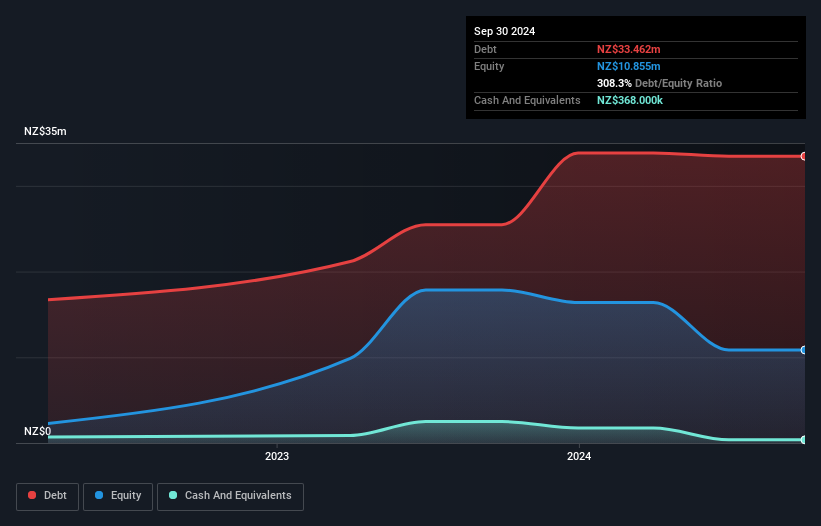- New Zealand
- /
- Commercial Services
- /
- NZSE:WCO
Health Check: How Prudently Does WasteCo Group (NZSE:WCO) Use Debt?

David Iben put it well when he said, 'Volatility is not a risk we care about. What we care about is avoiding the permanent loss of capital.' So it might be obvious that you need to consider debt, when you think about how risky any given stock is, because too much debt can sink a company. We can see that WasteCo Group Limited (NZSE:WCO) does use debt in its business. But is this debt a concern to shareholders?
Why Does Debt Bring Risk?
Debt assists a business until the business has trouble paying it off, either with new capital or with free cash flow. Ultimately, if the company can't fulfill its legal obligations to repay debt, shareholders could walk away with nothing. While that is not too common, we often do see indebted companies permanently diluting shareholders because lenders force them to raise capital at a distressed price. Having said that, the most common situation is where a company manages its debt reasonably well - and to its own advantage. The first step when considering a company's debt levels is to consider its cash and debt together.
Check out our latest analysis for WasteCo Group
How Much Debt Does WasteCo Group Carry?
You can click the graphic below for the historical numbers, but it shows that as of September 2024 WasteCo Group had NZ$33.5m of debt, an increase on NZ$25.5m, over one year. Net debt is about the same, since the it doesn't have much cash.

How Strong Is WasteCo Group's Balance Sheet?
According to the last reported balance sheet, WasteCo Group had liabilities of NZ$17.2m due within 12 months, and liabilities of NZ$33.4m due beyond 12 months. Offsetting this, it had NZ$368.0k in cash and NZ$6.01m in receivables that were due within 12 months. So its liabilities outweigh the sum of its cash and (near-term) receivables by NZ$44.2m.
This deficit casts a shadow over the NZ$21.2m company, like a colossus towering over mere mortals. So we'd watch its balance sheet closely, without a doubt. After all, WasteCo Group would likely require a major re-capitalisation if it had to pay its creditors today. There's no doubt that we learn most about debt from the balance sheet. But it is WasteCo Group's earnings that will influence how the balance sheet holds up in the future. So when considering debt, it's definitely worth looking at the earnings trend. Click here for an interactive snapshot.
In the last year WasteCo Group wasn't profitable at an EBIT level, but managed to grow its revenue by 38%, to NZ$53m. With any luck the company will be able to grow its way to profitability.
Caveat Emptor
Despite the top line growth, WasteCo Group still had an earnings before interest and tax (EBIT) loss over the last year. Its EBIT loss was a whopping NZ$2.3m. When we look at that alongside the significant liabilities, we're not particularly confident about the company. It would need to improve its operations quickly for us to be interested in it. It's fair to say the loss of NZ$7.6m didn't encourage us either; we'd like to see a profit. In the meantime, we consider the stock to be risky. There's no doubt that we learn most about debt from the balance sheet. However, not all investment risk resides within the balance sheet - far from it. These risks can be hard to spot. Every company has them, and we've spotted 2 warning signs for WasteCo Group (of which 1 makes us a bit uncomfortable!) you should know about.
Of course, if you're the type of investor who prefers buying stocks without the burden of debt, then don't hesitate to discover our exclusive list of net cash growth stocks, today.
Valuation is complex, but we're here to simplify it.
Discover if WasteCo Group might be undervalued or overvalued with our detailed analysis, featuring fair value estimates, potential risks, dividends, insider trades, and its financial condition.
Access Free AnalysisHave feedback on this article? Concerned about the content? Get in touch with us directly. Alternatively, email editorial-team (at) simplywallst.com.
This article by Simply Wall St is general in nature. We provide commentary based on historical data and analyst forecasts only using an unbiased methodology and our articles are not intended to be financial advice. It does not constitute a recommendation to buy or sell any stock, and does not take account of your objectives, or your financial situation. We aim to bring you long-term focused analysis driven by fundamental data. Note that our analysis may not factor in the latest price-sensitive company announcements or qualitative material. Simply Wall St has no position in any stocks mentioned.
About NZSE:WCO
WasteCo Group
Engages in the provision of waste and recycling, sweeping, and industrial cleaning services solutions in New Zealand.
Low and slightly overvalued.
Market Insights
Community Narratives




